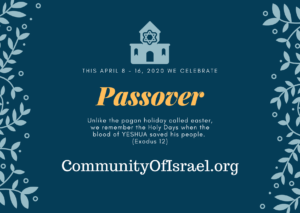 Passover
Passover
In this episode of The Holy Days of Israel, I would like to clarify what is happening in the World today and allow you an opportunity to observe the holy days of Passover through the lens of history, meaning and truth.
History
Some have said that there is no evidence of a famine or an exodus in Egypt. Others have said that the Passover ritual predated the Exodus. Yet, to this day the chosen people celebrate the Passover. But what exactly is this holy day? What is its purpose?
The Passover is the festival that celebrates the day the Spirit of God passed over and killed every firstborn in Egypt. During that time, the Hebrews that were in captivity in Egypt were told to mark the entrance of their house with the blood of a lamb. But, that could not be the blood of just any lamb – It had to be the blood on an unblemished lamb.
The Paschal lamb, as it is referred to in Judaism, represents the most momentous event in Jewish history. According to Exodus chapter 12, the people of God who followed the instructions and marked the doorposts with the blood of the lamb, were spared from destruction. They were saved. On the other hand, people who chose to ignore God’s instructions, were killed.
12 The Lord said to Moses and Aaron in Egypt, 2 “This month is to be for you the first month, the first month of your year. 3 Tell the whole community of Israel that on the tenth day of this month each man is to take a lamb for his family, one for each household. 4 If any household is too small for a whole lamb, they must share one with their nearest neighbor, having taken into account the number of people there are. You are to determine the amount of lamb needed in accordance with what each person will eat. 5 The animals you choose must be year-old males without defect, and you may take them from the sheep or the goats. 6 Take care of them until the fourteenth day of the month, when all the members of the community of Israel must slaughter them at twilight. 7 Then they are to take some of the blood and put it on the sides and tops of the doorframes of the houses where they eat the lambs. 8 That same night they are to eat the meat roasted over the fire, along with bitter herbs, and bread made without yeast. 9 Do not eat the meat raw or boiled in water, but roast it over a fire—with the head, legs and internal organs. 10 Do not leave any of it till morning; if some is left till morning, you must burn it. 11 This is how you are to eat it: with your cloak tucked into your belt, your sandals on your feet and your staff in your hand. Eat it in haste; it is the Lord’s Passover.
12 “On that same night I will pass through Egypt and strike down every firstborn of both people and animals, and I will bring judgment on all the gods of Egypt. I am the Lord. 13 The blood will be a sign for you on the houses where you are, and when I see the blood, I will pass over you. No destructive plague will touch you when I strike Egypt.
14 “This is a day you are to commemorate; for the generations to come you shall celebrate it as a festival to the Lord—a lasting ordinance.
Observance
The biblical holy days were given to the chosen people for observance. Observance to God’s instructions. These observances were extended to all believers. These set-apart days are a great object lesson from which to learn about God and his plan for the world.
Meaning
Pesach (Passover) is about the redemption and rescue provided by God to his people who were slaves in Egypt and it is symbolized by the unleavened bread and wine used during the annual Passover Seder dinner. It is a shadow of what was to come. The bread and wine became objects to remind us of Yeshua’s sacrifice. His body and blood was given for the redemption and rescue of humanity from the slavery to sin.
The celebrations of these holy days are to serve as a reminder of God’s commands, our choice to follow or not and the consequences that come from each choice. The concept of biblical accuracy is Holy-Spirit dependent. If you find it hard to understand, ask Him and He will review it to you.
“The concept of biblical accuracy is Holy-Spirit dependent.”
The Day
The holy day of Passover is celebrated in sequence: After the holy day of Purim (Feast of Esther) and before the feast of Unleavened Bread. It is as important to understand the significance of this sequence, as it is to understand each of those holy days individually.
Conclusion
In the year of 2020, Passover will begin in the evening of Wednesday, April 8 and end in the evening of Thursday, April 16.
As it was in Egypt, an angel of death lure’s over the world in 2020. So, be smart and mark your doorpost with the blood of the lamb of God. That’s a protection you must not forgo in 2020.
Be safe, and wash your hands.
Rabbi Douglas
